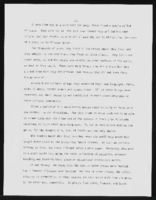Search the Special Collections and Archives Portal
Search Results

Rocio Rodríguez-Martinez oral history interview: transcript
Date
Archival Collection
Description
Oral history interview with Rocio Rodríguez-Martinez conducted by Elsa Lopez and Monserrath Hernández on June 21, 2019 for the Latinx Voices of Southern Nevada Oral History Project. Rocio shares her personal history growing up in Bogotá, Colombia and how she immigrated to the United States. She talks about motherhood, her Latina identity, and her experiences raising her daughter in Los Angeles and Las Vegas with her husband. Rocio also discusses her employment history and how she was able to achieve her professional goals of becoming a Spanish and English teacher for the Clark County School District (CCSD)'s Family and Community Engagement Services (FACES) program. Her interview is conducted in Spanish. Subjects discussed include: Bogotá, Colombia; El Salvador; Family and Community Engagement Services (FACES).
Text

Stewart family real estate documents
Date
Archival Collection
Description
Stewart family real estate documents
Text

Untitled unpublished manuscript by Roosevelt Fitzgerald
Date
Archival Collection
Description
From the Roosevelt Fitzgerald Professional Papers (MS-01082) -- Unpublished manuscripts file. "Injustice Blacks Have Suffered…" ending with Naomi Long Madgett's poem "Midway."
Text

Superior Court of California summons
Date
Archival Collection
Description
Text

Mei Yang oral history interview: transcript
Date
Archival Collection
Description
Oral history interview with Mei Yang conducted by Jourdin Wilson on November 10, 2021 for Reflections: The Las Vegas Asian American and Pacific Islander Oral History Project. University of Nevada, Las Vegas (UNLV) professor and graduate coordinator Mei Yang talks about her family and childhood in Shanxi Province, southwestern China. She shares her educational background pursuing her bachelor's and master's degrees in China before immigrating to the United States to earn her PhD in Computer Science from the University of Texas, Dallas. Mei Yang talks about her move to Las Vegas, Nevada, her work and professorship at UNLV, and her thoughts on pursuing a STEM (science technology engineering math) career as a woman. She shares how she raises her daughters in the United States away from her husband overseas, the Chinese community within Las Vegas, and traditions she celebrates.
Text
Alexis Hill (Washoe County Commisioner) oral history interview conducted by Magdalena Martinez: transcript
Date
Archival Collection
Description
From the Lincy Institute "Perspectives from the COVID-19 Pandemic" Oral History Project (MS-01178) -- Elected official interviews file.
Text

Sook-ja Kim, February 12, 1996 and April 6, 1996: transcript
Date
Archival Collection
Description
The Kim Sisters, composed of three sisters, Sook-ja, Ai-ja, and Mia, came from Korea to Las Vegas in February 1959. Their first contract in America was to perform at the Thunderbird Hotel for four weeks as part of the China Doll Revue, the main showroom program. This engagement led to a successful career. Their popularity reached was at its height at the end of the 1960s when they performed throughout the United States and Europe. Sook-ja Kim is the oldest of the sisters. After his sister Ai-ja died in 1987, Sook-ja teamed up with her two brothers and continued to perform until 1989. Now semi-retired from show business, with occasional performances in Korea, she is working as a real estate agent. In this interview, she talked about her childhood, her career, and the family she has built since coming to America. Sook-ja was born in 1941 in Seoul, Korea as the third child of seven in a musical family. Her father was a conductor and her mother, a popular singer. After the Korean War, her mother arranged to send the Kim Sisters to America. When they came to Las Vegas, there were virtually no Koreans in the area. They depended on each other to take care of themselves. Some of the difficulties they had to adjust to in American were language, food, and cultural differences. Over the span of almost forty years in America, Sook-ja became acculturated without discarding her ethnic identity of family priorities. Her life-long guiding principle has been to adopt certain American values while continuing to keep her cherished Korean ethnic values. Through their performances, the Kim Sister informed the audience about Koreans and their culture. As the oldest of the group, Sook-ja was entrusted the care of her sisters, and later her brothers, the Kim brothers. Once she settled in Las Vegas, she brought more than forty members of her extended family to the city, contributing to the growth of the Las Vegas Korean community.
Text
Bill Willard Photograph Collection
Identifier
Abstract
The Bill Willard Photograph Collection depicts Las Vegas, Nevada, hotels and casinos in Las Vegas, the Las Vegas Valley, and Laughlin, Nevada from 1905 to 1919 and from 1940 to 1999. The photographs primarily depict hotels and casinos in Las Vegas, including the Sahara Hotel, Circus Circus Hotel and Casino, MGM Grand Las Vegas Hotel and Casino, Caesars Palace, Flamingo Hotel, and the Aladdin Hotel. The photographs also depict students at Nevada Southern University (predecessor of the University of Nevada, Las Vegas), the city of Las Vegas, industrial plants in Henderson and Apex, Nevada, and events in Laughlin, Nevada.
Archival Collection
Women's Research Institute of Nevada (WRIN) Oral History Records
Identifier
Abstract
The Women's Research Institute of Nevada (WRIN) Oral History Records (1995-2015) are comprised of Dr. Joanne Goodwin's research, communication, and publicity relating to the Las Vegas Women Oral History Project. The records include correspondence, photographs of interview participants, news clippings, and working drafts of transcripts. The records also contain oral history interview documentation for projects in which WRIN and Joanne Goodwin provided assistance and consultation.
Archival Collection
Kiel Ranch Preservation Committee Records
Identifier
Abstract
The Kiel Ranch Preservation Committee Records (1973-2005) document the activities of the North Las Vegas Bicentennial Committee (1973-1976) and its successor, the Advisory Board for Kiel Ranch (1978-1995), in their efforts to restore Kiel Ranch, one of the earliest non-indigenous settlement sites in the Las Vegas, Nevada area. The collection contains various official reports on Kiel Ranch, proposals on how to restore Kiel Ranch, chronological files for each year of the project, and newspaper clippings on the status of Kiel Ranch.
Archival Collection
